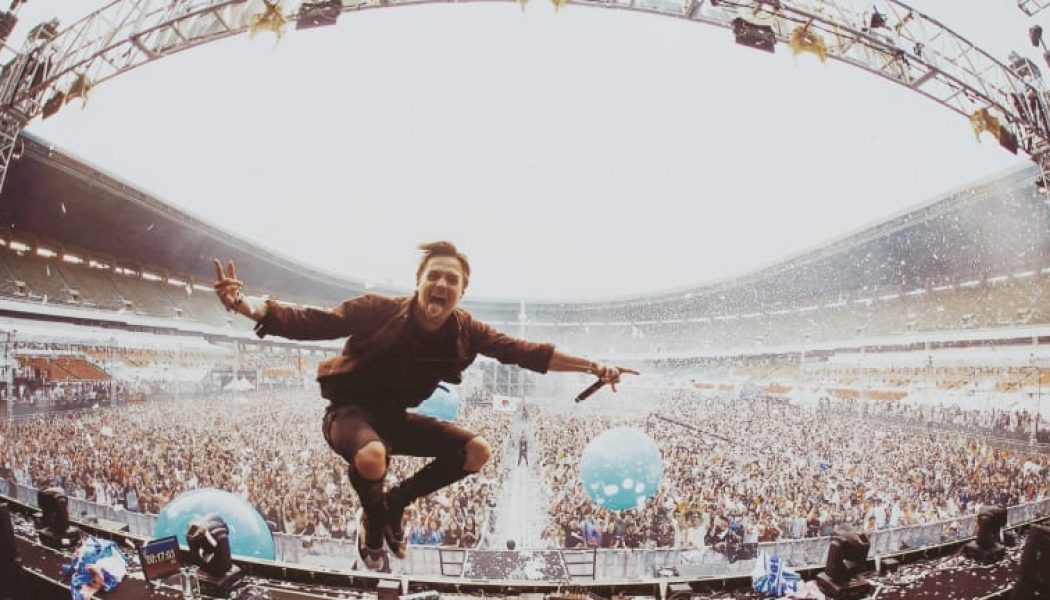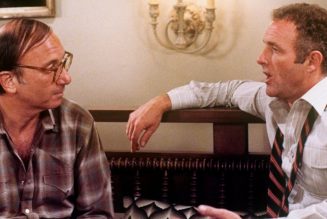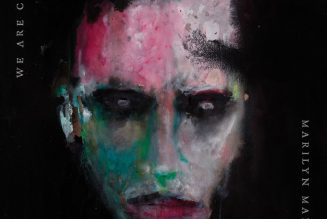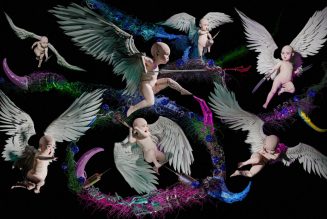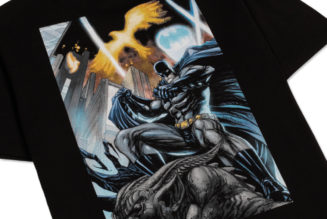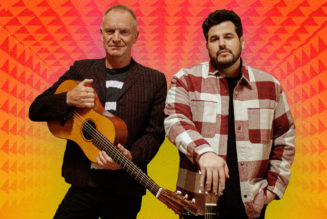Julian Jordan is a Dutch DJ and producer who has become a household name within the world of house music.
He’s released a surfeit of festival anthems on renowned EDM labels such as Spinnin’ Records and DOORN Records. He’s now officially signed to Martin Garrix’s STMPD RCRDS alongside label members Seth Hills, Dubvision, and Matisse & Sadko, among others.
Julian Jordan’s sound stands out amongst other house music heavyweights due to its sheer power, energy, and relentlessness that prowls throughout. His most recent release with TITUS, “Badboy,” is a paramount example of that sonic flair. The track blends trap, hip-hop, rap, and future house in a mesmerizing manner.
In an exclusive video interview on the When Life Hands You Lennons podcast, Jordan sat down to chat about his new sample pack and masterclass, music production during the pandemic, and his appearances on children’s shows, among many other topics.
Julian Jordan never intended to be an artist or play his music in front of a crowd.
It was always about having fun. He got into music at a young age and was heavily influenced by a number of artists and genres. Jordan was only 15 when he started playing music, so he didn’t have a day job at the time.
“For me there wasn’t [a notion] of what a job was supposed to look like,” he said. “I would get out of school and go right into performing, so I was already working. There was never the intention to become famous. I was just putting my music out online for fun.”
Then he noticed what other DJs and artists were doing. He was DJing after school, and he saw that a bunch of other DJs had press pictures. So he went and got press pictures taken. “I found a way to promote my music and then boom. It was there. I put out my music on SoundCloud. That’s how it started.”
He also needed an artist name for himself. In an interview with Nicky Romero for his “It’s Julian Jordan” series on YouTube, he explained to Romero that he got his stage name from combining his first name and Jordan shoes because he really liked them.
“It was actually pretty silly because it was just a minute of thinking,” says Jordan. “I was in my bedroom thinking that I needed a good catchy name. Julian, and I need something else that starts with a J because it’s catchy. Then I came up with Julian Jordan. I didn’t think about it that much. I was putting out my music on SoundCloud as Julian Jordan.”
He built his fan-base through an extensive touring schedule.
That’s certainly not happening with the coronavirus pandemic. While some musicians are performing drive-in shows, going live on Facebook, Twitch, and YouTube, it’s tough to fathom that music as we knew it in 2019 won’t be back in full swing until 2021 or 2022.
This shapeshifting move hasn’t dissuaded Julian Jordan, however. He’s found new ways to continue reaching new audiences and connecting with his fans.
“One of the main things I always focus on [is] social media to share my music,” says Jordan in the podcast. “That has always been one of the strongest things I do. It’s so important to have a good social media presence right now so you can show your fans that you’re still here and working. You can’t be on tour, at festivals, or in clubs, so it’s difficult to show people that you are still out there. I’m not the type that’s going to sit still and wait ‘till this is over. I’m going to keep working. I’m using this period to be in the studio as much as possible actually.”
He has always been into music, and he’s also a drummer.
Musicians’ love for music is one that is often picked up at an incredibly young age, and it follows them throughout their entire lives. You simply can’t take music away from a musician. They’ll always find a way to get back to it.
Julian Jordan’s love for music came at a young age. He says that he listens to everything, “as long as it has emotion in it.” His older brother was a big inspiration for him. He got Julian into the house music scene and showed him the first CDs with house and electronic music on them.
“I remember stealing [my brother’s] CDs from his room and playing them in my own CD player,” he says with a smile. “I was so inspired by that that I had to save money for a DJ set. And that’s how it all started.”
Julian Jordan didn’t always incorporate his drumming skills into his own productions. Now he does.
In the world of sequencing and computerizing everything, DJs, producers, and musicians alike don’t have to know how to play an instrument. I’ve personally watched numerous YouTube videos of people showing me how to write a melody. And they don’t even know music theory.
It all starts with the passion for music and creation. Then you download Ableton, Logic Pro X, FL Studio, or any other DAW and get to work.
Julian Jordan, however, is different. He’s been a musician for nearly his whole life. He said that he never used to incorporate his own drumming into his productions, but now he does. His most recent productions do include his own drumming.
“I’ve felt like it would give a cool element to my recent productions,” Jordan explains. “So my recent productions include me drumming. They’re not acoustic drums. They’re still electric, but the drumming really helped me think in other rhythms that other producers may not have thought about.”
And these unique rhythms do shine through in Jordan’s productions. He’s mastered the element of surprise and transitions.
He’s always trying to challenge himself in his productions, but he’s not trying to reinvent the wheel.
You don’t have to reinvent the wheel, and Julian Jordan has learned to let go of the thought that you have to invent something completely when creating. You don’t.
“I always try to challenge myself. I want to think outside the box,” he asserts. “Let go of the fact that you have to invent something new. That’s not something you should have to live by because you’re going to be too hard on yourself.”
Challenge yourself, “but not too much,” Jordan says with a smile. “I grab the main elements of what describes the Julian Jordan sound and play around with different genres. I get inspired by listening to a lot of music.”
Every producer should continually expand their horizons and listen to other genres of music. Don’t limit yourself to just the genre you’re producing. You should be listening to all genres except the one you’re producing. I’ve found that comparison comes heavily into play when specifically listening to dance music for production inspiration.
“For example, my track ‘Badboy’ [with TITUS] has a rap part in the middle break,” Jordan says. “It’s just a big switch in the whole production, and I really like to incorporate that in all of my releases.”
When starting a song, there’s no secret formula to creating it. Some tracks take longer than others to finish.
There never has and never will be a golden formula to creating and finishing a piece of music. All musicians have a different workflow, regardless of genre and style.
“I can make a track in 30-minutes or it could take me weeks or months,” says Jordan. “There’s not a secret way to do it. Sometimes I start with the drums. Sometimes I start with a part that has a certain rhythm.”
And projects evolve over time. It’s not uncommon for a project to begin as one idea and then end up being something completely different.
“My song ‘Badboy’ started as a techno project,” Jordan continues. “It completely changed from the first project file to the last part of it. It’s funny how it starts. I can’t really tell [when that happens]. I’m in my own world when I’m producing. Sometimes I’ll take my friends into the studio with me and I’ll get lost on my screen. I’ll hear them laughing behind me saying, ‘He’s lost on the screen.’ Then there’s a complete production out there. They don’t really understand how I did it, but I did.”
It’s important to never force yourself to keep working on something that isn’t moving forward.
“It’s very important to not force yourself,” Jordan says when talking about creating. “When you force [creative people] into creating something, nothing comes out. For me it’s all about having fun. The fun in music is that it’s just freedom. It really works the best for me when I feel inspired, I’m full of energy, and I’m rested. I don’t have to have the feeling of making a hit song. I just want to be in my comfort zone and make magic. That’s what works best for me.”
Give yourself ample room to make mistakes and let creativity flow. If and when you get stuck, do something very different. Go for a walk. Call a friend. Watch Netflix. This helps by getting out of writer’s block.
When an idea comes to mind at an inconvenient time, Julian Jordan is always nearby his PC or phone to record a voice memo.
Waking up in the middle of the night with a catchy melody happens to every musician. Losing that idea is terrifying. Always be at the ready to record a voice memo or jump over to your DAW and get it out.
“I do this a lot,” says Jordan. “I hum it into a voice memo or I take a video. I’m so scared that I’m going to lose the idea, so I already put them in my phone. That is the main thing I do.”
The pandemic changed our lives forever. We completely changed our daily routines to fit a drastically new way of life.
Julian Jordan didn’t have to change his routine too much. One of the most important things to him is remaining true to his fans. He says that a number of DJs and producers shifted to a more commercial sound, but he remained authentic to himself and his fans.
Nobody is going out to clubs or festivals, so why would we need club tracks? This is why a lot of producers have transitioned from the club anthems into a more commercial sound.
“I think it’s important that we stay producing that club music as well,” says Jordan. “It’s important for me to stay producing my own sound and show fans that it’s all about the love for music. When I started making club music, I was 14-years-old. I couldn’t go to a club when I was 14, so it was just pure love for that type of music. It really feels like I’m going back to my first years of producing and getting that total freedom again instead of having to think about the crowd I have to play for.”
Julian Jordan’s sound is heavily reliant on a unique method of sound design. Here’s how he does it.
He used to produce a lot of hip-hop for artists when he was younger. This has allowed Jordan to become such a diverse producer and DJ.
He uses Xfer’s Serum for bass lines and finds a preset that is close to what he’s looking for and tweaks it to his liking. Jordan says that he’s mostly sample-based.
“When I discovered Splice, it was a really big thing for me because I had the ability to discover so many sounds in a big, big cloud online,” he says. “I would look for hours and hours to find the right sounds. I found the best way to find samples that nobody else is using: Type in random words in Splice. It will populate the most popular sounds first. Edit that so it shows you random sounds first. That’s when the best sounds start coming up. They are sounds that no one is using.”
Getting an idea out of your head and into a project is difficult, and Julian Jordan thrives on the element of surprise.
Some artists can get ideas out quicker and actually do what they want. That’s true skill. For others it’s a matter of starting with a preset or a specific sound that they like and working with it. Apply filters, distortion, EQ, compression, limiting, expansion, and any other effect you can think of. Get it to a place that is even more badass than before and work with it. Build around that sound.
When asked about this, Jordan responded, “I always try to surprise myself a bit. I don’t really think about something I want to have. I just twist buttons until a sound comes out that I get inspiration from. A sample or a preset can give me a lot of inspiration.”
Mixing and mastering are the processes that make an artist’s sound unique.
Second to the actual production, songwriting, and stylistic choices, the mix and master will make or break the sound. So, how does Julian Jordan maintain his sound? Does he mix and master his own tracks or is he having mixing and mastering engineers do the work?
“I always test [my mixes and masters] on different systems,” says Jordan. “A lot of people listen to [music] in their cars, so I always want to make sure that my tracks sound good in my car’s system but also on my home speakers. My track has to sound good on every sound system: my phone, laptop, and home system. It doesn’t always have to sound good on my studio monitors, but it has to sound good on everything else. I’m always tweaking it with different sound systems and trying to show it to other people as well. That’s a big part of my A&R. I show it to my friends and family. If they vibe and bounce to it, then that’s good.”
The measurement of what’s good is different for each track. Sometimes the focus is the bass line. Sometimes it’s the melody.
This comes back to the artist’s sound. What is the sound? What is the style known for? What makes Julian Jordan’s tracks sound like Julian Jordan? To him, every track is different. If there’s a prominent bass line at the forefront, then making sure that the bass line stands out and is prominent is where the focus will lie.
“I want the listener to focus on a certain part of the track,” states Jordan. “As a producer it’s important to not get too technical with everything. That ruins the creativity. The tracks that work best are the ones that you remember from a certain sound. I always try to do that with my productions.”
Hone in on your sound. Find sounds that you like, not ones that are popular. Don’t copy other artists and producers doing something that you enjoy. They are already doing that. Learn your sound systems and train your ears. As you continue to evolve as an artist and producer your sound will take shape and you’ll stand out amongst other artists.
Julian Jordan inspires the younger generation by appearing on a children’s show. And he continues to connect with fans through his It’s Julian Jordan YouTube series.
The DJs behind the booths in the clubs and at festivals are people. They have feelings. They have lives. Sometimes it’s hard to picture our idols as actual people, especially when we only see tiny slivers of their personal and professional lives on social media. This is why Julian Jordan started his It’s Julian Jordan YouTube series–so fans can get a better glimpse inside of his life.
He went on a children’s show to inspire the younger generation. He has a younger nephew who is starting to get into music and finds it very interesting on the type of music he’s listening to and how he’s discovering it.
“[The younger fans] are the fans of the future, and we have to inspire the young kids as well instead of people that can go to clubs and festivals,” he says. “I was also inspired, as a 12-year-old kid, by electronic music. I couldn’t go to festivals. I couldn’t go to clubs. I was still inspired enough to start as a DJ. Inspiring the younger generation is a really important thing.”
We’re in the world of Facebook, Twitter, and Instagram, but the younger generations may not transition onto these platforms.
Julian Jordan and I (and probably you reading) grew up using Facebook, Twitter, Instagram, and maybe even Myspace. However, the younger generations don’t use these platforms. I know my younger brother never uses Facebook, rarely uses Instagram, and sporadically uses Twitter.
TikTok is the new thing. It has exploded over the last year, and I remember two years ago when music professionals and marketers were saying that TikTok is going to explode in the next year or two. They were right.
“I never saw TikTok expanding as big as it has,” states Jordan. “Everyone started using it, including the younger generation, so I really had to understand it. It’s funny how big things can get with the younger generations. I already feel old and I’m only 25.”
Julian Jordan’s sample pack contains one-shot samples, Serum and Spire presets, vocals, two projects, percussion samples, and a masterclass.
The best way to learn something is to teach it. This is exactly why Julian Jordan has released his very own sample pack and masterclass. Educating other producers and artists on the ins and outs of music production is inspiring to him. There is simply nothing more beautiful to him than when he can inspire other people to create.
The masterclass is recorded in 4K and contains an in-depth look into his creative process creating “Badboy.” You’ll get an inside look at how he tweaks and edits sounds. It’s incredibly important to show upcoming producers–or people that are just interested in music production–how he works.
Included in the sample pack are one-shot samples (kicks, claps, cymbals, percussion), Serum and Spire presets, vocals, vocal shots, two projects for a number of different DAWs, and the masterclass.
You can grab the sample pack and masterclass for €79 here.
He wants to be known for inspiring as many people as he possibly can with his own sound.
Leaving a lasting legacy as an artist is no easy feat, but Julian Jordan has already set himself in motion to leave a positive legacy on the electronic music scene and the world.
“My mission is to inspire as many people as possible with my own sound,” he says. “[As a touring artist], my mission is to have fun and reach as many people as possible. I also want to be myself and show the people what I’m working on all of the time and what my passion is. If I can inspire other people by doing that that’s already a mission accomplished.”
FOLLOW JULIAN JORDAN:
Facebook: facebook.com/itsjulianjordan
Twitter: twitter.com/julianjordan
Instagram: instagram.com/itsjulianjordan
Spotify: spoti.fi/34tgBow

